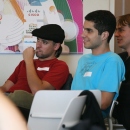Content Assessment Systems
Contributors: Ismael Peña-López
The idea is comparing the traditional academic system of double blind peer review with other systems emerging on the Information Society to assess content in online communities, like the ones used in Wikipedia, Slashdot or Digg. But without using computers: everything off-line, analogue.
A project within the framework of the Bank of Common Knowledge, the idea is to help communities — online or offline, whatever — to evaluate their incoming content in order to assess its suitability for their purposes. To do so, we created a workshop were the rudiments of several systems (three, so far) were explained, compared and practiced in simulations of situations where such content had to be evaluated... Read more
MonaLisa.torrent: P2P Game
Contributors: Platoniq
a) Concept, practise, tool in which it is inspired upon
The peer-to-peer file sharing (P2P) communications protocol BitTorrent
b) Goals
• Dealing with the concept of reproduction as a positive paradigm for creation and collective production
• Representing a possible work methodology based on horizontal learning
• Adressing cooperative action as a problem-solving strategy in human activity coordination
• Dealing with the concept of commons as a resource usage structure
• Introducing state-of-the-art technology
c) Operating instructions
• Introduction to basic P2P and the Bittorrent protocol
• A competition game is laid out, with groups of 4 or 3
• Each group is given a photocopy... Read more
Collective Moderation
Contributors: MetaReciclagem, Felipe Fonseca
Collaborators: Leo Germani, Elenara Iabel, Marcelo Braz, Wanderlynne Selva, MetaReciclagem.org mailing list.
The world wide web has been proposed in the early nineties as a free space, through which anyone could have access to a wide diversity of human knowledge. Later on, the web has also been identified as a brave new world in which every person would have the opportunity to interact with virtually any other and share his/her own knowledge, adding to the creation of a "collective intelligence", which would contain all sorts of useful (and also useless) information. If in one hand that has led to real disruptive technologies allowing new voices to be expressed throughout the world, on the other hand the huge amount of information available in any single moment exceeded what a person could be... Read more
Juego Posiciones, Posicionamientos
Contributors: David Gómez
PRESENTACIÓN
Conocí esta metodología hacia el año 1992, en un taller sobre democracia participativa dinamizado por Stefano Puddu y Oriol Leira en la asociación Ecoconcern. Posteriormente, he utilizado esta metodología en algunas ocasiones, sobre todo en el ámbito docente.
OBJETIVOS
Los objetivos dependerán del contexto donde el juego se aplique y del tema que se esté tratando, pero algunos de los objetivos a alcanzar podrían ser:
Hacer visibles las posiciones dentro de un grupo, obtener un "mapa" de los puntos de vista sobre una cuestión. Aproximarse a posiciones de consenso. Hacer visibles las discrepancias y/o conflictos dentro del grupo. ... Read more
Who Wants To Be?
Contributors: The People Speak, Saul Albert
Introduction
What follows is an explanation of a particular set of methods developed since 2004 by The People Speak to help large groups of people with highly diverse ideas, opinions and points of view to make important decisions as a group, to come to creative compromises, and to have fun in the process.
This explanation may serve as a guide for others wishing to facilitate decision making in related situations. It is likely that the methods will require adaptation in each instance. If you or your group choose to use these strategies and techniques and have observations or improvements to suggest, please contribute them to the project wiki.
Spontaneity
Who Wants to Be? is a spontaneous, democratic gameshow, where the audience makes up the questions, has all the answers and sets the rules. The basic premise is that every member of the audience has a vote, and that they can propose ideas... Read more
Page: 1

 IMAGE
IMAGE PDF
PDF